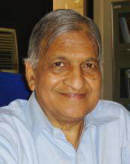
The Delhi Declaration was followed by reflections and observations by Dr. Delmer T. Robinson, Shri Gulab Chand Kataria, Prof V.S Vyas, Yuvacharya Mahashramanji, Acharya Mahapragyaji, Prof. Dayanand Bhargava, Dr. Ved Prakash and Swamini Parmananda Saraswati.
Dr. Delmer T. Robinson said that the words of economics heard during the last two days were all educating, encouraging, but were very complex. Bringing around a peaceful order appears to be a Herculean task.
Prof. Vyas viewed the conference as an attempt to converge two different streams, one is spiritually inclined and the other comprising professional social activists, dissatisfied with the fundamentals of economics, society and politics.
Dr. Ved Prakash affirmed that the fault does not lie in economics, it lies in the human brain. It’s our thinking that makes us bad, compels us to exploit others. So we need to give a new direction to our thinking, and in this effort spiritual idols like Acharya Mahapragyaji can guide us.
Swamini Parmananda Saraswati made her reflection by saying that there is a problem in the head, we blame the world, blame ourselves, blame the third entity, God, who doesn’t even oppose. We need some altar to blame, to blame our ignorance of ourselves and our erroneous perception about ourselves and the world. The basic inadequacy needs to be addressed and this adequacy is not seen to exist in other creations of the universe.
The three models of Dharma-preconventional, conventional and post-conventional, propose that humanity requires a paradigm of spiritualism. This means the knowledge that makes us understand that all that is here is a manifestation of the divine, one cosmic form of God-the metaphysical reality. Any himsa to this cosmic form is not a small step that a human being in ignorance takes.
He is poor whose longings are vast but a heart which is content with the knowledge of divine, outside and within, is never poor. Such a being can enjoy the culture of Ahimsa Parmo Dharma.
Yuvacharya Mahashramanji
In the current scenario, human life is overwhelmed by money. This engenders violence and crimes. Economics connected with compassion and morality is the economics of non-violence.
He strongly felt that organizing such conferences was not enough. There has to be an action plan and strict adherence to that plan in its implementation, if a difference has to be experienced.
Acharya Mahapragyaji
The conference seeks to find a bridge between two extremes of a river. Materialism and spiritualism represent the two banks of a river, which have no connection in the form of a bridge.
He concluded by saying that the greatest achievement of social life is peaceful co-existence and the right vision to solve the social problems. It is here that Anekant gives us the right vision. The three principles of anekant are -
- Relativity
- Balancing
- Co-ordination
There has to be a change in the economic system as it lacks relativity. There is no balancing, no effort to mitigate the distance between the rich and the poor. He concluded by making a strong comment which is as follows:
“If poverty is a problem, then prosperity is a still bigger problem”
This was followed by an open dialogue between the delegates and Acharya Mahapragyaji.
At the end, Mr. Mayank Choubisa, faculty IILM, Jaipur proposed a vote of thanks.
 Dr. Ashok Bapna
Dr. Ashok Bapna